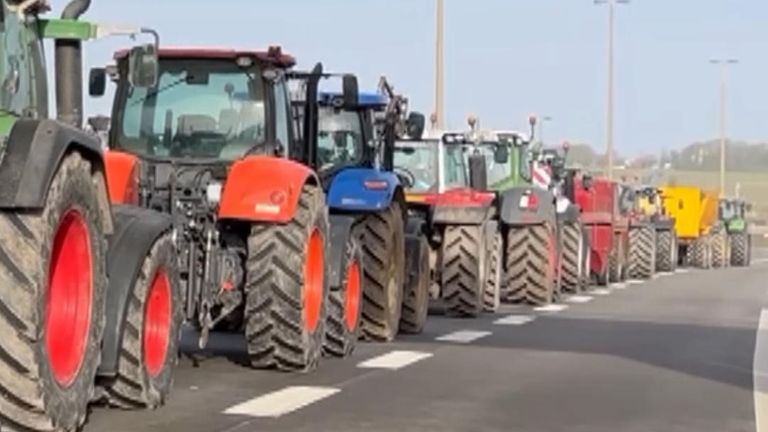The blockades that are being set up around Paris speak of two things – the anger of farmers and also of their determination to see this protest through to its conclusion.
Their grievances are long-standing, based on the premise that politicians in Paris and Brussels simply don’t understand the problems facing farmers in the rest of the country.
And at the heart of it is money.
Farmers – in France and beyond – maintain that their incomes are falling to such an extent that their jobs are barely sustainable.
Partly this is down to the rising costs they face – the price of fertiliser has increased hugely, for instance, since the start of the war in Ukraine, while imports of Ukrainian grain into Europe have forced down the price of that produce.
In fact, the impact of cheaper imports is another complaint that you hear at these protests.
If cheap lamb is coming in from abroad, for instance, that inevitably reduces the price that a domestic farmer can achieve.
For this, they blame free trade agreements that, they say, benefit foreign farmers at their cost.
Another frequent complaint is that a huge growth in the regulations governing farming, notably environmental rules, have forced them to spend valuable time in the office when they should be out in the fields.
“It used to be a few hours a month and now it’s one day per week,” according to one farmer.
Tax breaks, such as the one that cut the price farmers paid for diesel, have been reversed.
And all the while, farmers believe that the government has ignored them; that their role in feeding the nation has been forgotten.
These protests aren’t confined to France. Germany has seen enormous demonstrations, with tractors pouring into some of the nation’s biggest cities.
Farmers had already taken to the roads in Poland and Romania and now there are fresh protests springing up daily in Belgium, Italy, Spain and elsewhere.
This is a European movement, even if much of the focus is trained upon France.
And the targets of anger are usually the same – national governments who are seen as failing to support their farmers, and the European Union, which is blamed for imposing burdensome regulations.
Read more:
Hundreds of tractors chug towards Paris in protest
French farmers block roads with tractors
Farmers say there is a contradiction between the EU’s desire to be self-sufficient with its food and the red tape imposed upon its agricultural sector.
The European Commission President Ursula von der Leyen, architect of the EU “green deal” that is often cited as the problem, has few friends among the protesting farmers.
Somewhere, at national and EU levels, there will have to be an effort at reconciliation.
For the moment, at least, the anger is simmering; it won’t take much for it to boil.
This story originally appeared on Skynews





